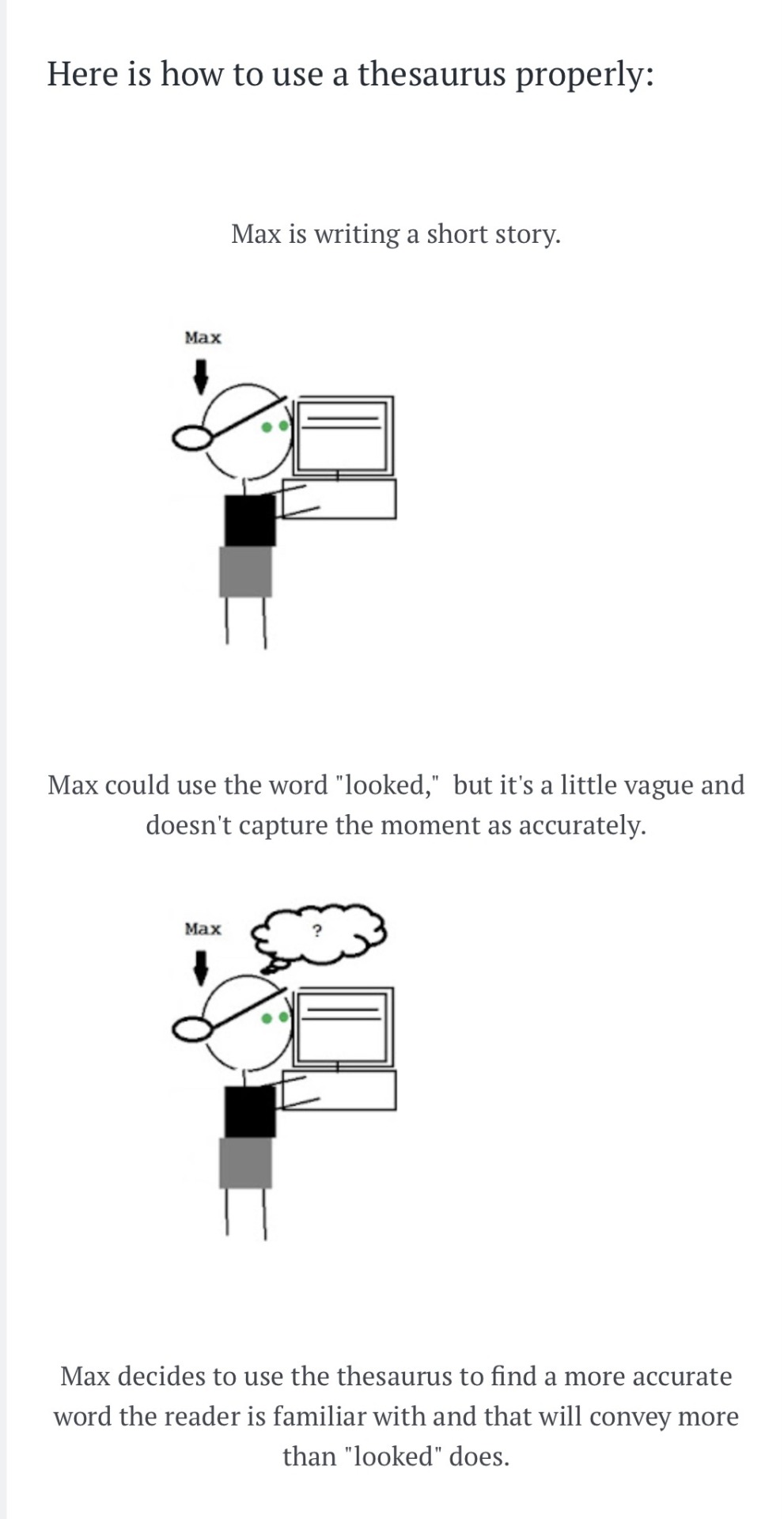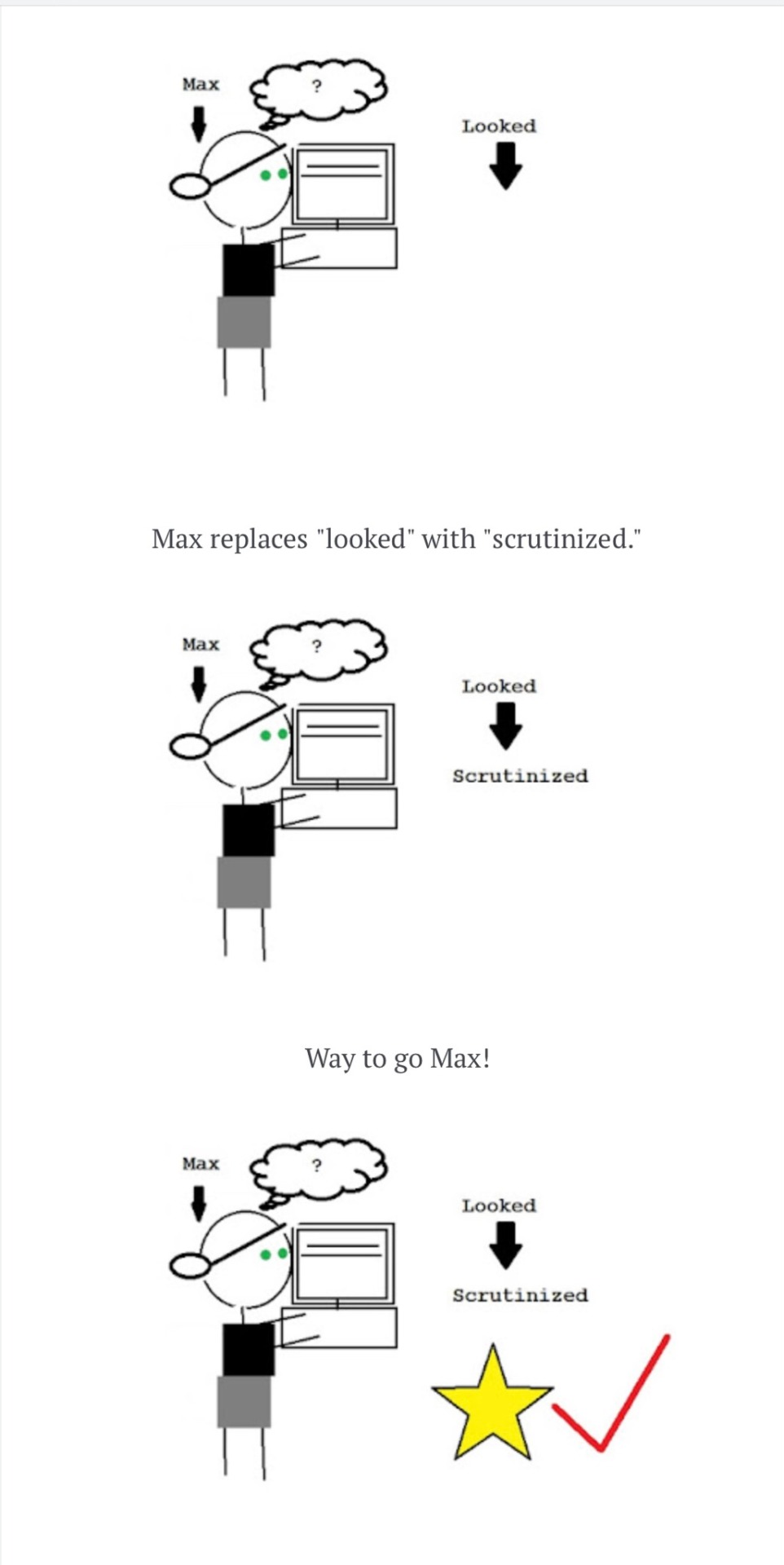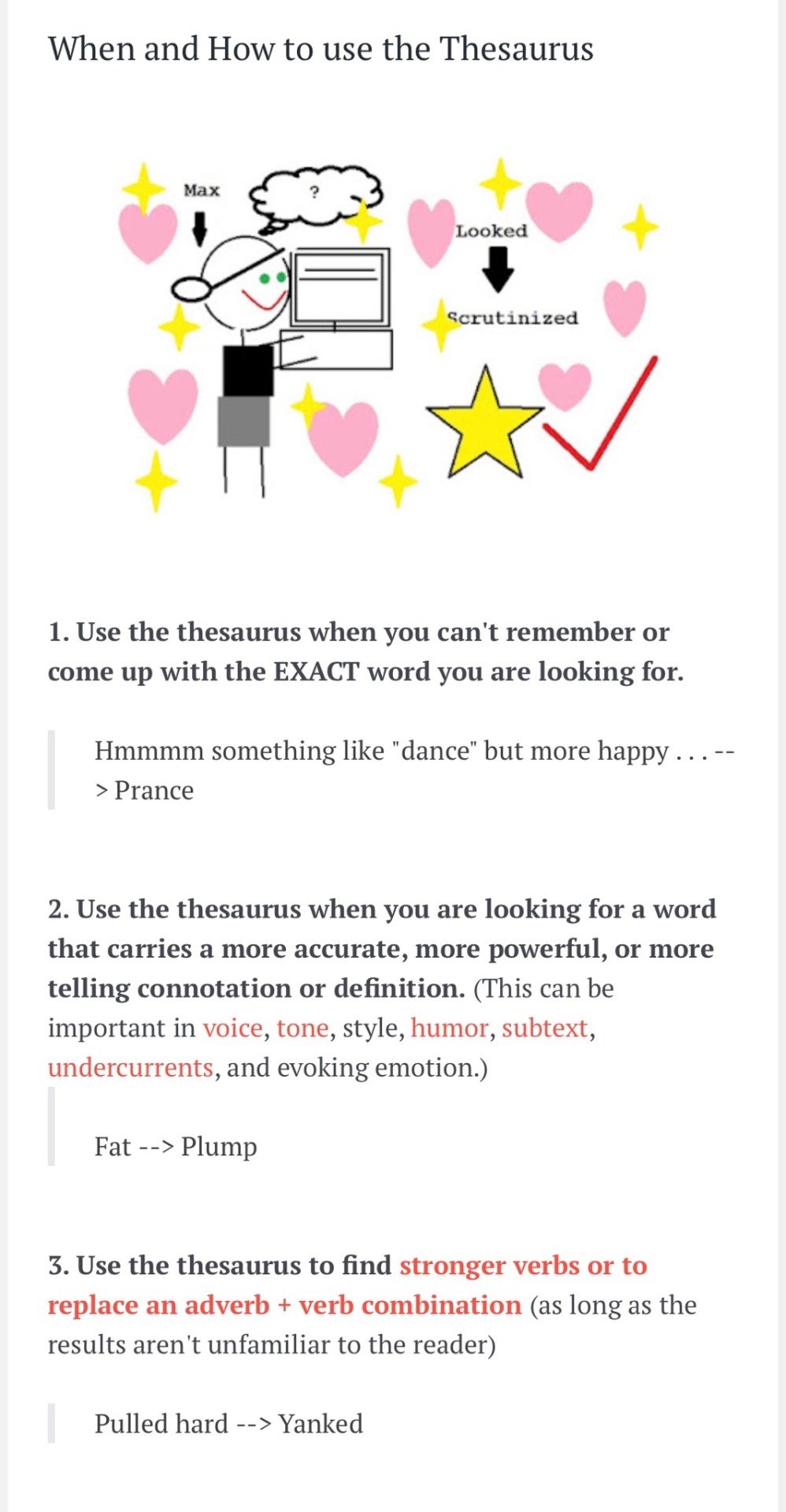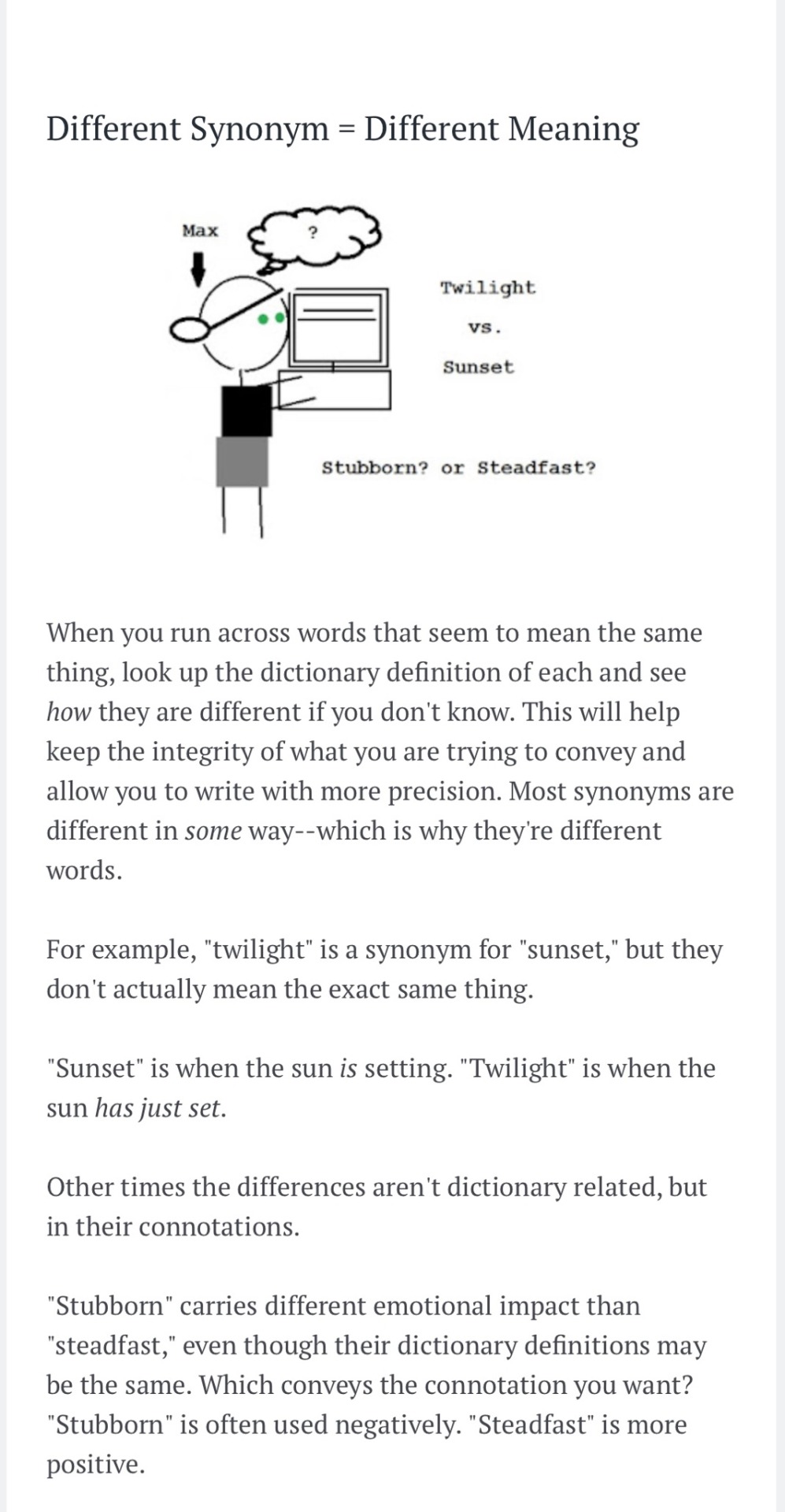I Hate To Say This, And Like, Rain On Everyone’s Parade, But After Scrolling Past Three Posts About
I hate to say this, and like, rain on everyone’s parade, but after scrolling past three posts about it on a writing tag …
If you are looking up synonyms to exchange words out in your story with the purpose of sounding smarter, more sophisticated, or complicated to your reader, you are probably abusing the thesaurus.
Now, if you *want* to do this, I mean, you can write whatever or however you want! But I just want you to know that this is frowned upon if you are trying to write at a professional level.
I have an old article on this somewhere …







If you want to look at the original article…
https://www.septembercfawkes.com/2018/08/how-to-use-thesaurus-properly.html

More Posts from Lune-versatile and Others
please please please please reblog if you’re a writer and have at some point felt like your writing is getting worse. I need to know if I’m the only one who’s struggling with these thoughts

Controlling Your Pacing
Pacing is one of my favourite things to pay attention to when reading or writing something. The pacing of a scene is literally how ‘fast’ or ‘slow’ a scene appears to be moving. Action scenes that spring the story from one place to another tend to go faster than introspective scenes or scenes that explore character dynamics.
All of this is created through putting space and words between elements of the scene. What I mean by that is that readers interpret a passage of time between ‘things’ (actions, dialogue, gestures, etc.) on the page, and pacing is controlling that interpretation.
For example,
“Georgia sat on the couch, “wow it sure is hot in here,” she said. “It sure is,” Henry agreed, sitting next to her.”
This sentence is just about the actions with some breaking dialogue, but it goes pretty quickly through what’s happening.
Whereas, if we were to intentionally pace this scene, it may look like this:
“Georgia swiped at her brow, wandering over to sink into the couch. “It sure is hot in here,” she said, peering up at Henry through the wisps of her bangs. He nodded weakly, his entire body sagging from the heat. Crossing the room to collapse next to her, he added dryly, “it sure is.”
It’s not perfect, but you can get a sense of the time between things happening. The added detail between the two characters talking conveys maybe a minute between sentences, which might be accurate for two people dogged down by a heat wave.
To speed things up, we want less space between elements:
“Adam slammed open the door with his shoulder, letting it bounce off the concrete wall behind him. “Everyone out!” He shouted. A crack in the roof snapped above them.”
The added (or subtracted) elements of a scene that control your pacing is the sights/sounds/feelings/smells/maybe tastes of a place. When we’re anxiously rushing to get out of the house we may not acknowledge that the kitchen smells like the bread our roommate baked that morning, or that there are smudges on the window from when the dog climbed up on the couch. However, when we have a second to contemplate, we’re going to notice these things, and it would be appropriate to write them in.
Another important element to controlling pacing is your character’s thoughts or acknowledgement of feelings.
For example:
“Adam slammed open the door with his shoulder, it bounced off the concrete wall behind him. He winced, his mother’s high voice ringing in his head, chiding him for damaging the walls even though he knew the building was coming down on top of them. How long would he live with her constantly in his mind? He tried to wave away the memory. “Everyone out!” He shouted.”
That slows down the scene quite a bit, yeah? And maybe that’s what you wanted in that moment. Play around with the details and pacing in your scenes, you might be surprised how much can change.
Good luck!
Chapters: 1/1 Fandom: One Piece Rating: General Audiences Warnings: Creator Chose Not To Use Archive Warnings Relationships: Roronoa Zoro/Vinsmoke Sanji, Roronoa Zoro & Vinsmoke Sanji Characters: Roronoa Zoro, Vinsmoke Sanji, Kuina (One Piece), Monkey D. Luffy, Portgas D. Ace, Aka Ashi no Zeff | Red-Leg Zeff Additional Tags: Soulmates, Alternate Universe - Soulmates, POV Alternating Summary:
A soulmate's words on your right arm doesn't always mean something special, or so Zoro and Sanji naively thought.
reminder to worldbuilders: don't get caught up in things that aren't important to the story you're writing, like plot and characters! instead, try to focus on what readers actually care about: detailed plate tectonics
u know what, even if my writing isnt the BEST, i still made it all on my own. like there was a blank word doc and i filled it up with my own words, my own story. i took what was in my head and i made it a real thing. idk i feel like that alone is something to be proud of.
(Help) advice for people who have been writing for a long time and haven't seen improvements?
ok, so first of all have you REALLY not improved? most of the time when we are working on complex tasks, our ability to see what we are doing wrong grows more quickly than our skills, so there's this constant, growing awareness of what we aren't doing well. i suspect if you look back at your first stories, you will see that they are clumsier than your current work
BUT, it's frustrating. i get it. hoo boy do I get it.
SO... the advice you asked for.
sit down and do a really cold-blooded assessment of your work. ask a couple CPs to help if you can bear it. figure out several places you have a clear weakness.
common things people struggle with include:
mechanics (grammar, punctuation, how to format dialogue, etc.)
prose (how does it read on a line level)
engaging opening pages (do people reading the start want to keep going, does it set up promises for the rest of the book to pay off, do we know, as readers, what sort of story we're getting from the first page)
characters (do the people feel real, do they behave in the way people behave, are they well rounded with flaws and strengths, do their stupid decisions seem believable given their own set of issues)
pacing (does the story feel too slow to readers? does it seem to skip over important moments)
plotting/structure (does the middle sag, do things build up in a compelling way, do plot points come out of nowhere, are there too many moving pieces)
stakes (are there stakes? what is the main character's goal? what happens if they fail?)
theme/mood/vibe (do you have a vibe? is there an overarching theme?)
emotions (are your characters/is your plot emotionally engaging to the reader)
climax (does it stick the landing)
pick ONE (and only one) identified weakness to work on for the next 3-6 months. Google resources that talk about that thing. write or revise aiming to work on that thing. (if you ask for a specific one of these, I will put together a list of resources, but it might be a bit much on an already long post to include here)
shake up your working methods to see if that knocks skills loose from your brain in the learning process. if you usually outline, try just brain dumping onto the page, focusing on that thing. If you usually pants it, try outlining.
go back to beta readers and CPs and say "how does this story work FOR THIS ONE PARTICULAR THING." It's much easier to beta read a chapter for someone if you know the thing that they want you to focus on is "prose" or "emotions" than "just anything that jumps out at you."
good luck and have fun!
HOW TO GIVE PERSONALITY TO A CHARACTER
Giving personality to a character is an essential part of character development in storytelling, whether you're writing a novel, screenplay, or creating a character for a role-playing game. Here are some steps and considerations to help you give personality to your character:
Understand Their Backstory:
Start by creating a detailed backstory for your character. Where were they born? What were their childhood experiences like? What significant events have shaped their life? Understanding their past can help you determine their motivations, fears, and desires.
2. Define Their Goals and Motivations:
Characters often become more interesting when they have clear goals and motivations. What does your character want? It could be something tangible like a job or a romantic relationship, or it could be an abstract desire like happiness or freedom.
3. Determine Their Strengths and Weaknesses:
No one is perfect, and characters should reflect this. Identify your character's strengths and weaknesses. This can include physical abilities, intellectual skills, and personality traits. Flaws can make characters relatable and three-dimensional.
4. Consider Their Personality Traits:
Think about your character's personality traits. Are they introverted or extroverted? Shy or outgoing? Kind or selfish? Create a list of traits that describe their character. You can use personality frameworks like the Myers-Briggs Type Indicator or the Big Five Personality Traits as a starting point.
5. Give Them Quirks and Habits:
Quirks and habits can make a character memorable. Do they have a specific way of speaking, a unique fashion style, or an unusual hobby? These details can help bring your character to life.
6. Explore Their Relationships:
Characters don't exist in isolation. Consider how your character interacts with others. What are their relationships like with family, friends, and enemies? These relationships can reveal a lot about their personality.
7. Show, Don't Tell:
Instead of explicitly telling the audience about your character's personality, show it through their actions, dialogue, and decisions. Let the reader or viewer infer their traits based on their behavior.
8. Create Internal Conflict:
Characters with internal conflicts are often more engaging. What inner struggles does your character face? These can be related to their goals, values, or past experiences.
9. Use Character Arcs:
Consider how your character will change or grow throughout the story. Character development is often about how a character evolves in response to the events and challenges they face.
10. Seek Inspiration:
Draw inspiration from real people, other fictional characters, or even historical figures. Study how people with similar traits and backgrounds behave to inform your character's actions and reactions.
11. Write Dialogue and Inner Monologues:
Writing dialogue and inner monologues from your character's perspective can help you get inside their head and understand their thought processes and emotions.
12. Consider the Setting:
The setting of your story can influence your character's personality. For example, a character who grows up in a war-torn environment may have a different personality than one raised in a peaceful, affluent society.
13. Revise and Refine:
Don't be afraid to revise and refine your character as you write and develop your story. Characters can evolve and change as the narrative unfolds.
Remember that well-developed characters are dynamic and multi-faceted. They should feel like real people with strengths, weaknesses, and complexities. As you write and develop your character, put yourself in their shoes and think about how they would react to various situations. This will help you create a compelling and believable personality for your character.
write EVERY DAY. here's how.
where inspiration fails, habit will always have your back. this is why it's important to build writing into your life as a habit, if you ever want to finish a project or improve your skills.
back in 2018, i (nat) was a college student without much going for me. i was feeling creatively stifled and insecure and like i didn't have TIME to write good. and i was right. i didn't have time to write GOOD. but i did have time to write SOMETHING. so that january, i built the habit. i wrote every single day in 2018, and almost every single day since.
because once you establish the habit, it becomes safer to skip a day (or three days) here and there. you will at least THINK about writing every day, even if you go straight from work to social plans to bed, or you're on vacation, or you're too sick to write. and that thinking is part of the habit!
here are the tips i followed to make this happen.
-pick a reasonable goal. starting off, mine was 300 words. now, i don't follow a goal, because the habit is so solid i don't need to. but 300 words is easy and quick. and if you give a pig a pancake, they'll probably have days where they write 500, 1000, even 3k words.
-log your word count. this is interesting to look back on every new year's eve, and it provides accountability. do this however you like; a spreadsheet, a physical notebook, a note in your phone, each day's section in your planner, whatever works for you. i have a channel in my personal discord server where i log mine.
-do NOT edit as you go. just write write write. if you feel like something you wrote needs work, yeah, it probably does-- everything needs to be edited, but that's a problem for later. highlight sentences you can't get right or make note of them to edit LATER. but do not edit as you go!
-write self-indulgent crap. fanfiction, shitty poetry, manifestos, rants, self insert fantasy romance, whatever floats your boat. having a shitty self-indulgent backup story to work on when i didn't feel like writing for the projects i cared about really helped get me in the habit. write for an audience of one!
-journal if you can't write. this may not necessarily build your skill as much as writing regular prose would, but it does help you maintain the habit and it can be useful in lots of other ways.
-think outside the box. write trivia questions. write a list of your favorite childhood toys. write a review of the book you're reading. i'm writing this post, that's going toward my word count for the day. again, this is still writing, and it helps maintain the habit.
-get comfortable writing on your phone. this took me a long time, but making it over this hurdle has saved my habit so many times.
you'll be surprised at the cool shit you end up writing on those days when you swore you weren't inspired enough. and you'll be delighted with how much progress you will make honing your craft!
happy writing! if you have any questions about how to implement any of these tips, our ask box is always open.
Tips for Build up the tension
Introduce a mysterious character or event that captures the reader's interest from the outset, like a protagonist receiving a cryptic message or stumbling upon a hidden artifact.
End a chapter with a sudden revelation or a character in peril, leaving readers eager to find out what happens next. For instance, a chapter ending with the sound of a gunshot but without revealing who fired it.
Drop hints about future events or conflicts throughout the story, such as a character experiencing recurring nightmares that seem to foretell danger.
Introduce friction between characters with opposing goals or values, leading to heated arguments or tense standoffs.
Use a narrator with a skewed perspective or hidden agenda, causing readers to question the accuracy of the events described.
Describe the setting in a way that evokes a sense of foreboding or unease, like a dark, abandoned mansion shrouded in mist.
Gradually unveil the protagonist's backstory or a central mystery piece by piece, keeping readers guessing and eager for more revelations.
Subvert genre conventions or tropes to keep readers guessing, such as portraying a seemingly trustworthy character as the ultimate villain.
Incorporate unexpected plot twists or betrayals that challenge the protagonist's assumptions and force them to adapt.
-
 askthe7 reblogged this · 3 days ago
askthe7 reblogged this · 3 days ago -
 askthe7 liked this · 3 days ago
askthe7 liked this · 3 days ago -
 lacommunarde liked this · 3 days ago
lacommunarde liked this · 3 days ago -
 jeanblogvandamn liked this · 3 days ago
jeanblogvandamn liked this · 3 days ago -
 honeyabumblebee liked this · 3 days ago
honeyabumblebee liked this · 3 days ago -
 emberleaf23 liked this · 3 days ago
emberleaf23 liked this · 3 days ago -
 alldewonderfulfandoms reblogged this · 3 days ago
alldewonderfulfandoms reblogged this · 3 days ago -
 alldewonderfulfandoms liked this · 3 days ago
alldewonderfulfandoms liked this · 3 days ago -
 anxious-ace reblogged this · 3 days ago
anxious-ace reblogged this · 3 days ago -
 landaquarium liked this · 4 days ago
landaquarium liked this · 4 days ago -
 opossumwhoisvivian liked this · 4 days ago
opossumwhoisvivian liked this · 4 days ago -
 nah--fam reblogged this · 4 days ago
nah--fam reblogged this · 4 days ago -
 hectorthehappyhippo reblogged this · 4 days ago
hectorthehappyhippo reblogged this · 4 days ago -
 ilikeforests liked this · 4 days ago
ilikeforests liked this · 4 days ago -
 witchcraft-in-wonderland liked this · 4 days ago
witchcraft-in-wonderland liked this · 4 days ago -
 daedricprincessorigin reblogged this · 4 days ago
daedricprincessorigin reblogged this · 4 days ago -
 daedricprincessorigin liked this · 4 days ago
daedricprincessorigin liked this · 4 days ago -
 bedtime-bathtime-and-beyondtime reblogged this · 4 days ago
bedtime-bathtime-and-beyondtime reblogged this · 4 days ago -
 sentientcloudofmusk reblogged this · 4 days ago
sentientcloudofmusk reblogged this · 4 days ago -
 sentientcloudofmusk liked this · 4 days ago
sentientcloudofmusk liked this · 4 days ago -
 void-of-erebos reblogged this · 4 days ago
void-of-erebos reblogged this · 4 days ago -
 antarcticajoy liked this · 4 days ago
antarcticajoy liked this · 4 days ago -
 nothisgrill reblogged this · 4 days ago
nothisgrill reblogged this · 4 days ago -
 fall-from-andromeda reblogged this · 4 days ago
fall-from-andromeda reblogged this · 4 days ago -
 lil-tumbles reblogged this · 4 days ago
lil-tumbles reblogged this · 4 days ago -
 lil-tumbles liked this · 4 days ago
lil-tumbles liked this · 4 days ago -
 pinkninjas liked this · 4 days ago
pinkninjas liked this · 4 days ago -
 livefromtheelephantsfoot reblogged this · 4 days ago
livefromtheelephantsfoot reblogged this · 4 days ago -
 sir-phineas-lost reblogged this · 4 days ago
sir-phineas-lost reblogged this · 4 days ago -
 sir-phineas-lost liked this · 4 days ago
sir-phineas-lost liked this · 4 days ago -
 exhaustioninducedapathy reblogged this · 4 days ago
exhaustioninducedapathy reblogged this · 4 days ago -
 courtjester reblogged this · 4 days ago
courtjester reblogged this · 4 days ago -
 house-elf-magic reblogged this · 4 days ago
house-elf-magic reblogged this · 4 days ago -
 house-elf-magic liked this · 4 days ago
house-elf-magic liked this · 4 days ago -
 m1nzyzul1c reblogged this · 4 days ago
m1nzyzul1c reblogged this · 4 days ago -
 m1nzyzul1c liked this · 4 days ago
m1nzyzul1c liked this · 4 days ago -
 tranquilraven liked this · 4 days ago
tranquilraven liked this · 4 days ago -
 petscopstoner liked this · 4 days ago
petscopstoner liked this · 4 days ago -
 tvchirps liked this · 4 days ago
tvchirps liked this · 4 days ago -
 devendrawsart liked this · 4 days ago
devendrawsart liked this · 4 days ago -
 luneyverse reblogged this · 4 days ago
luneyverse reblogged this · 4 days ago -
 fin-kedinn liked this · 4 days ago
fin-kedinn liked this · 4 days ago -
 birdsandproblems reblogged this · 4 days ago
birdsandproblems reblogged this · 4 days ago -
 birdsandproblems liked this · 4 days ago
birdsandproblems liked this · 4 days ago -
 iamingreen reblogged this · 4 days ago
iamingreen reblogged this · 4 days ago -
 iamingreen liked this · 4 days ago
iamingreen liked this · 4 days ago -
 stygianbluetentacles reblogged this · 4 days ago
stygianbluetentacles reblogged this · 4 days ago -
 spicywreck liked this · 4 days ago
spicywreck liked this · 4 days ago -
 salubri-outcast reblogged this · 4 days ago
salubri-outcast reblogged this · 4 days ago -
 spirits-of-kin reblogged this · 4 days ago
spirits-of-kin reblogged this · 4 days ago
